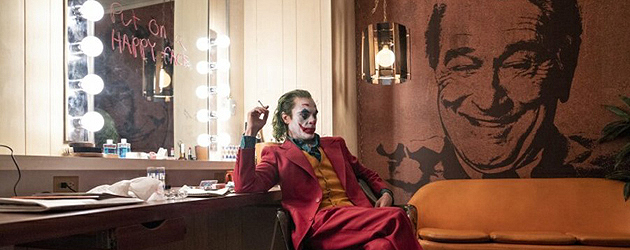Mark Friedberg

AS: How do you feel about comic book movies in general?
MF: I don’t disparage them but I don’t go see comic book movies. That’s not my interest. I didn’t even want to read the scripts. In fact, I didn’t want to read Joker when it was first sent.
AS: I remember you did The Amazing Spiderman 2…
MF: It’s not me. Three hundred million dollars for that movie. What I spent just in my budget I could have made three Selmas. I want to make the kind of movies I want to see. I’m more of an indie person. I love movies that generally don’t come out of studios. The movies that come out of people scraping it together, figuring it out, often that come from other countries. The cool thing about Joker is that it was an independent film that just happened to be financed by a non-independent studio. In the beginning they were even worried, Is Joaquin the right guy for this? They wanted somebody even more famous. It’s a business. They’re laying out fifty, sixty million bucks -they want it back. On the other hand Todd Phillips has made them a lot of money. And I guess they trust him. Enough to give this a shot. It seems to have worked out pretty well for them.
AS: How involved was Todd Phillips with the production design?
MF: Very. I sat with him at the interview and I said two things. I said, It should look like you, a camera person and the actor tumbled out of the van and started shooting. It shouldn’t be dutched angles, noir-ish comic angles. The stakes are real and so should the visuals be. I wanted to go far away from the comic version of this story. And he’s like, I’m already there. And then I said, If you go halfway it won’t make it. You gotta go for it and risk ruining your career to maybe do something brilliant. It’s a great script and you have a great actor and a great point of view and if you’re uncompromising and resist the urge to make it pretty, it’ll be stronger. It wasn’t like I had to convince him of that. It was more like he had to convince me that he was there. And he was.
AS: How does working with him compare to working with Wes Anderson on The Life Aquatic and The Darjeeling Limited?
MF: Wes’ movies are stylized. Wes’ storytelling is stylized. There is very little that they have in common as storytellers.
The director is the conductor. He’s Leonard Bernstein. He stands in front of the whole orchestra. The orchestra is made up of sections- the strings, the winds, the percussion. A movie is similarly orchestral. The director conducts, the sections are the various departments: camera department, art department, lighting, costume, sound and music departments. The best movies, in my opinion, are when the director has everyone playing in same key, in harmony. In the director’s control we are synthesized into this story’s telling and hopefully it all works together to propel our character through the plot and on the arc of their journey. Each harmony makes each department work better. It’s phenomenal how much better my sets look once the music gets put in.